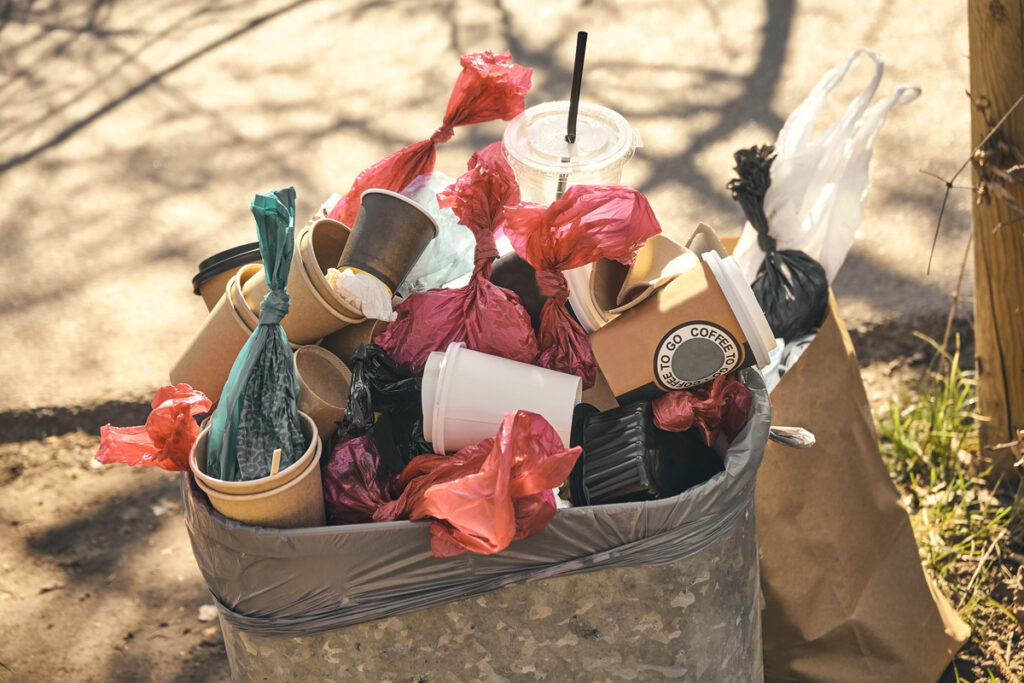
The growing problem of single-use packaging waste has highlighted the need for more sustainable solutions in the out-of-home sale of food. This is exactly where the “Reusable Model City” project comes in and has established itself as an innovative and groundbreaking project to reduce single-use packaging. State environmental ministries, state capitals, federal associations and many companies are jointly taking on the challenge of “returning reusable items across providers”. By developing and implementing new approaches and a comprehensive effectiveness analysis, the project was able to achieve initial successes and provide valuable insights for the future.
Table of contents
Project goals & challenges
Who doesn't know it? Many shops now offer reusable tableware so that the coffee cup doesn't end up going straight into the trash can after drinking. However, the reusable cup often has to be returned to the same store so that the deposit can be paid back. And this is one of the big problems with current reusable solutions.
Robert Reiche, Managing Consultant at CONET: With it In order for reusable to-go products to receive the same level of acceptance among consumers as reusable beverage bottles, return across providers is essential. The taking-back companies must be relieved of the burden through local reusable circuits. This is where we need to start.
Accordingly, the goal of the “Reusable Model City” project was to create a logistical and digital infrastructure that Provider-independent return of reusable items is possible. This should support the obligation to offer reusable products for out-of-home sales and significantly reduce the use of disposable packaging. However, the introduction of such systems is complex because consumers are confronted with different reusable offers and systems. In particular, the large number of isolated solutions with different business models and deposit systems posed a challenge.

Disposable cups generate huge amounts of waste every day. Reusable models can counteract this.
In order to meet these challenges, the “Reusable Model City” project created a space for them collaborative development and testing of return points for reusable itemsreverse logistics by existing inner-city logistics service providers, hygienic cleaning and re-provision of the items as well as billing and deposit clearing systems. A large number of actors with existing solutions were involved in order to build a nationwide scalable concept.
Implementation & Results
A central part of the project was the development of a concept for the return of reusable cups regardless of the provider. A network of reusable providers, food logistics companies, municipal businesses and participating companies was set up in local shops and via reverse vending machines in public spaces. Total took 11 companies with 92 issuing and return points actively participate in the reusable cycle.
Sustainability with CONET
CONET offers you comprehensive sustainability advice and will find the right solution for you – regardless of whether it is an initial greenhouse gas balance or a complex sustainability strategy. CONET is your strong partner for sustainability!
About our services
Another highlight was the introduction of reverse vending machines, inspired by the Kooky2Go concept from Zurich and Bern. These machines allowed consumers to Reusable cups can be returned easily and conveniently in public spaces. At the same time, a set of rules and a process organization for reverse logistics and cleaning of the cups was developed. The effectiveness of these measures was precisely measured by digitally recording and tracking serialized reusable cups.
The results of the project were promising:
- Over 90 percent of the reusable cups remained in the cities of Mainz and Wiesbaden
- Reusable To-Go operates on a very local scale. Hardly any diffusion between Mainz and Wiesbaden (
- 68 percent of the reusable cups were returned to the dispensing company (regular customer effect)
- The average orbital period was 38.3 days. People sometimes use the cups several times, which negatively affects the speed of circulation, but still reduces the number of disposable cups used
- The use of existing logistics on site is possible. Hardly any errors in the process from day 1 because many processes were known and there was good training. Working with reusable professionals pays off because they know their local customers very well. The digitalization of processes is also important because the data obtained can be used to improve sustainable business models.
Success factors & scaling
Several key factors were identified for scaling reusable offerings. The simple, cross-provider return of the cups ensured greater convenience for consumers. A quantity balance between the companies that take back a lot of cups and those that give out a lot ensured availability. It was also shown that the positive approach and motivation of customers by the staff resulted in a led to a significant increase in the reusable rate. The project achieved a 15-fold increase in reusable output compared to the previous year.

Reusable cups are a sustainable alternative to disposable cups that end up in the trash after use.
The use of existing logistics infrastructures proved to be efficient and cost-effective. It was shown that integrating existing service providers ensures the timely collection and cleaning of the cups. These processes can also be transferred to other consumer-oriented reusable containers, such as in e-commerce. This not only promotes sustainability, but also strengthened the local economy.
Conclusions
The “Reusable Model City” project has impressively demonstrated that sustainable solutions can be achieved through innovative approaches and the collaboration of various actors from business, administration and civil society to reduce single-use packaging waste are realizable.
Robert Reiche, Managing Consultant at CONET: Companies can cope well with cross-provider returns if reverse logistics and billing are organized. Local networks are a great way to connect circular and economy in a community.
The insights gained and concepts developed offer valuable inspiration for the future design of sustainable urban structures and can serve as a model for other cities.
The successful implementation and positive response from both companies and consumers underline the importance and potential of reusable systems. The “Reusable Model City” project has taken a significant step towards a more sustainable future and shows how collaborative efforts and innovative concepts can create a more environmentally friendly and livable city.
Sustainability with CONET
CONET offers you comprehensive sustainability advice and will find the right solution for you – regardless of whether it is an initial greenhouse gas balance or a complex sustainability strategy. CONET is your strong partner for sustainability!
About our services
Was this article helpful to you? Or do you have further questions about sustainability? Write us a comment or give us a call.

Niklas Ludwig has been Communication Manager at CONET since March 2020 and takes care of internal and external communication for the CONET group of companies.
Source: https://www.conet.de/blog/mehrweg-modell-stadt-ein-umfassender-schritt-in-richtung-nachhaltigkeit/



